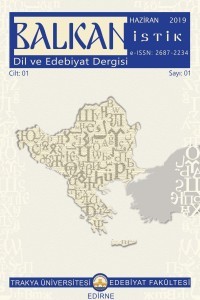J. P. SARTRE’IN “ANGAJE EDEBİYAT”I IŞIĞINDA DİMİTIR DIMOV’UN TÜTÜN’ÜNÜN KARAKTER BİÇİMLENDİRMELERİNDEKİ KIRILMALAR
Dimitır Dimov, Angaje Edebiyat, Sosyalist Gerçekçilik
THE FRACTIONS OF THE CHARACTERIZATION IN DIMITAR DIMOV’S TOBACCO IN THE LIGHT OF J. P. SARTRE’S “COMMITTED LITERATURE”
Dimitar Dimov, Committed Literature, Socialist Realism,
___
- BOSCHETTI, Anna (1988), The Intellectual Enterprise: Sartre and Les Temps Modernes, Richard C. McCleary (Çev.), Evanston: Northwestern University Press.
- CRAMPTON, Richard J. (2005), A Concise History of Bulgaria, Cambridge: Cambridge University Press.
- DİMOV, Dimitır (1998a), Tütün-1, Burhan Apad (Çev.), İstanbul: Evrensel Basım Yayın.
- DİMOV, Dimitır (1998b), Tütün-2, Burhan Apad (Çev.), İstanbul: Evrensel Basım Yayın.
- EAGLETON, Terry (2014), Edebiyat Kuramı: Giriş, Tuncay Birkan (Çev.), İstanbul: Ayrıntı Yayınları.
- GORKİ, Maksim (2014), “Küçük-Burjuva İdeolojisinin Eleştirisi”, Şerif Hulusi (Çev.), https://www.marxists.org/turkce/gorky/0001.htm, (Erişim Tarihi: 25 Mayıs 2022).
- JDANOV, Andrey (1996), Edebiyat, Müzik ve Felsefe Üzerine, Fatmagül Berktay (Çev.), İstanbul: Kaynak Yayınları.
- METODIEV, Metodi (2014), “’The Good,’ ‘the Bad,’ and ‘the Evil’ in the Socialist Novel: A Case Study of Two Bulgarian Novels”, Tropos, 1 (1), 59-68.
- METODIEV, Metodi (2017), The Writers, the Conflicts and Power in Bulgaria and Czechoslovakia 1948-1968, University of Glasgow, School of Modern Languages and Cultures, Yayımlanmamış Doktora Tezi, Glasgow.
- NEUBURGER, Mary C. (2013), Balkan Smoke: Tobacco and the Making of Modern Bulgaria, New York: Cornell University Press.
- RILEY, Alexander Tristan (2010), Godless Intellectuals?: The Intellectual Pursuit of the Sacred Reinvented, New York: Berghahn Books.
- SARTRE, Jean-Paul (1988), “For Whom Does One Write?”, “What is Literature?” and Other Essays, Bernard Frechtman (Çev.), Massachusetts: Harvard University Press.
- SARTRE, Jean-Paul (1988), “Introducing Les Temps modernes“, What is Literature?” and Other Essays, Jeffrey Mehlman (Çev.), Massachusetts: Harvard University Press.
- SARTRE, Jean-Paul (1988), “What is Writing?”, “What is Literature?” and Other Essays, Bernard Frechtman (Çev.), Massachusetts: Harvard University Press.
- SARTRE, Jean-Paul (1988), “Why Write?”, “What is Literature?” and Other Essays, Bernard Frechtman (Çev.), Massachusetts: Harvard University Press.
- UNGAR, Steve (1988), “Introduction”, “What is Literature?” and Other Essays, Massachusetts: Harvard University Press.
- VEREMIS, Thanos (2017), A Modern History of the Balkans: Nationalism and Identity in Southeast Europe, Londra: I.B. Tauris.
- Yayın Aralığı: Yılda 2 Sayı
- Başlangıç: 2019
- Yayıncı: Trakya Üniversitesi
ARNAVUTÇAYA GEÇMİŞ TÜRKÇE SÖZCÜKLERİN KAZANDIĞI SOYUT ANLAMLAR
Sindi BİLİBASHİ, Fatma Sibel BAYARAKTAR
BULGAR TÜRKOLOG DİMİTIR GACANOV VE MAKEDONYA MÜSLÜMANLARIYLA İLGİLİ HAZIRLADIĞI RAPORU (1916)
İSMAİL KADARE'NİN RÜYALAR SARAYI ROMANININ POLİTİK İMALARI VE POETİK KATMANLARININ AÇILIMLARI
